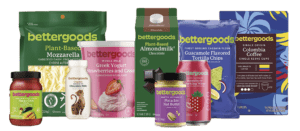This year will truly be the year of data management
Although inflationary pressures eased a bit in 2024, consumers have become so good at saving that it is now a permanent factor influencing consumer behaviour. The big question now is how retailers can attract the attention of consumers, who are becoming more careful spenders, and what they need to do if they wish to preserve their trust.
This article is available for reading in Trade magazin 2025/2-3.
The unprecedented growth of discounters and private labels last year indicates: consumers are still searching for the best deal, so they will be looking carefully at what they put in their shopping basket this year, with value for money still being a key factor. According to NIQ data, 87% of shoppers have changed their habits, with an average of 3.9 saving strategies per shopper.
2025 is the year of data management
NIQ believes the combination of pricing and promotional strategies is the key to success. According to the market researcher, shoppers are spending 36% more compared to 2019, but promotions alone aren’t delivering the return on investment they used to. It is now also important to define the specific purpose of promotions to make them effective. 2025 can be a turning point for data management in the retail sector: this year data will truly be a matter of life and death.

Customers tend to stick to their re-designed shopping habits
Management consultancy Dr Wieselhuber & Partner says the biggest benefit of data management relying on AI will be that retailers and manufacturers can better understand customer behaviour, target marketing more effectively and optimise processes in the future. By analysing production, warehousing and logistics data, companies can improve capacity utilisation while also reducing warehousing costs.

Technology in retail is increasingly becoming a business tool to support the work of employees
Fine-tuning the health trend
In 2025 FMCG retailers should carry on supporting shoppers in developing or maintaining healthy eating habits, by making products affordable and accessible, says Dunnhumby Americas. Today – more or less adapted to the financial difficulties – consumers are turning their attention to their own well-being and they are working not only to extend their lifespan, but also to improve their health. There is no sign of a complete shift to natural, organic products just yet, but there is definitely a slow move in the direction of healthier, better quality food. Increased transparency of food labels and the recent repositioning of products using health and wellness attributes such as “added protein” or “low sugar” have played an important role in this process, as they raise consumer awareness of healthier eating.
Serious pressure from private labels
Competition for innovation between private labels and brands is expected to intensify this year, as the battle is going on for shopper money. The global private label market is booming, driven by affordability and quality, we can read in NIQ’s Mid-Year Consumer Outlook: Guide to 2025, where half of respondents say they are buying more private label products than ever before. Industry analysts expect this momentum to continue into 2025, as retailers are building even more specialised and carefully selected private label offerings. Discounters traditionally have a strong a private label product selection, but last year made it clear that any retailer can successfully develop its own product range. Over the next 2-3 years the use of smart shopping carts, digital coupons and recipe apps in FMCG retail could grow significantly, according to a report by Kroger’s analytics division, 84.51°. While only 10-11%of shoppers use meal planning apps and smart shopping carts at the moment, more than 40% said they would be willing to try them in the future.

Retailers are building an even more specialised and carefully selected own-brand offering – for example, Walmart’s bettergoods brand of vegetable options
AI is personalising the customer experience
AI use made a breakthrough in various fields of FMCG retail last year, including product stock forecasting, category management and retail media. For 2025 experts predict that AI use will become more targeted, particularly in the area of personalising the customer experience. Kantar sees a big role for generative AI in the personalisation of loyalty programmes, which will improve both the online and offline customer experience, for example through search functions. McMillanDoolittle expects AI-based recommendation systems to become increasingly fast. In order to lower the environmental impact and increase the sustainability of manufacturing processes, the principles of the circular economy can also be incorporated into product innovation. This means that from the outset products are designed to operate in a closed loop, i.e. raw materials can be recycled or reused throughout their life cycle, by this minimising waste generation. //

Tablets on shopping trolleys can be used intuitively by shoppers
Related news
PwC Global CEO Survey: CEO confidence at a five-year low
🎧 Hallgasd a cikket: Lejátszás Szünet Folytatás Leállítás Nyelv: Auto…
Read more >The keys to corporate growth in 2026: AI, acquisitions and rapid transformation
🎧 Hallgasd a cikket: Lejátszás Szünet Folytatás Leállítás Nyelv: Auto…
Read more >Related news
Festive table, new habits
🎧 Hallgasd a cikket: Lejátszás Szünet Folytatás Leállítás Nyelv: Auto…
Read more >








